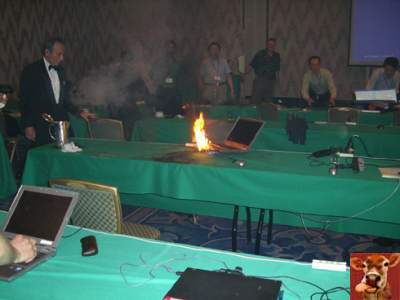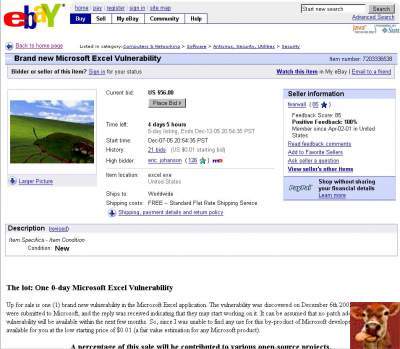|
PATH: BS | Technology | Computers
|
Cats and Dogs Protect Web Sites From Spammers
Posted by Pile
(31193 views) |
 [Eureka!] |
| If you've been online for any length of time you know that many web sites now have a system called CAPTCHA which is a "human recognition system" that tries to stop automated programs from posting messages online. This is usually done by tossing up an annoying image with distorted numbers and letters and asking a user to repeat the phrase. Sometimes even humans can't read the stupid images. Enter Microsoft with their Asirra project. They're working on a new human-detection technology which also has the added benefit of promoting animal adoption. In combination with Petfinder, they display images of animals and ask the user to identify the difference between cats and dogs. This system is apparently much harder to defeat than regular CAPTCHA, and you could end up with a fuzzy new companion in the process! | |
READ MORE | 1 comment since 2008-08-18 16:18:40 | Comment on this Article | |
|
MPAA Caught Pirating Software
Posted by Pile
(24841 views) |
  |
 The Chairman of the MPAA (Motion Picture Association of America). You remember the MPAA right? This is the high-and-mighty organization that is in charge of convincing and threatening people with legal action if they violate copyright or licensing terms of movies and music. The Chairman of the MPAA (Motion Picture Association of America). You remember the MPAA right? This is the high-and-mighty organization that is in charge of convincing and threatening people with legal action if they violate copyright or licensing terms of movies and music. It turns out the MPAA blog is run by a piece of software called "Forest Blog" - a Freeware blog, and one of the few things the author asks is that if you use the software in a commercial environment, pay about $40 for the registration, and don't remove the links to the author's original site. Of course, the MPAA apparently installed the software, didn't register and removed the links and credits from it before they let their executives use the blog software to rant and rave about the evils of piracy. To make matters worse, the MPAA ignored the author's initial requests to legitimize the software, until it became public, then they pulled the site and sent him a letter saying the blog they installed was a "proof of concept" and didn't have its own domain, so therefore it wasn't an issue. Even though then, they didn't pay for the software! | |
READ MORE | No comments | Comment on this Article | |
|
Microsoft Windows Vista May Destroy iPods
Posted by Pile
(19624 views) |
  |
| If you have an iPod, Apple is now recommending that upgrading to Microsoft's new Windows Vista may be a big mistake -- aside from the previous rants about the software nerfing your XP license, not allowing downgrades and other issues, the latest is, according to Apple, Vista could destroy your iPod! | |
READ MORE | 11 comments since 2008-08-18 18:06:44 | Comment on this Article | |
|
Nintendo Worried About Uncoordinated Wii Users
Posted by Pile
(11268 views) |
[Faulty Products] |
 With the Wii console due to be released in Europe tomorrow and already out in other major territories, Nintendo execs have acknowledged media reports of uncoordinated gamers causing damage to televisions, furniture, and even fellow players. With the Wii console due to be released in Europe tomorrow and already out in other major territories, Nintendo execs have acknowledged media reports of uncoordinated gamers causing damage to televisions, furniture, and even fellow players.The next-generation, motion-sensitive controller that Nintendo's new videogame uses is apparently causing gaming nerds to flail about in their living rooms, causing damage. Nintendo's response to the issue? It's telling gamers to "calm down." Calm down? After you stood in line for several days in the freezing cold to pick up these units, maybe they're just flailing about to bring circulation back to their limbs? | |
READ MORE | |
|
Just When You Thought Your Network Was Secure
Posted by Pile
(9120 views) |
  |
| Check out this video from England demonstrating what people can find out from you in very short order... and you thought you were taking precautions so nobody could get access to your computer or data right? | |
READ MORE | No comments | Comment on this Article | |
|
Adobe PDF "features" Leave Users Vulnerable
Posted by Pile
(11412 views) |
[Faulty Products] |
| A British security researcher has figured out a way to manipulate legitimate features in Adobe PDF files to open back doors for computer attacks. David Kierznowski, a penetration testing expert specializing in Web application testing, has released proof-of-concept code and rigged PDF files to demonstrate how the Adobe Reader program could be used to launch attacks without any user action. | |
READ MORE | |
|
Microsoft Dares Hacker Community To Expose Vista
Posted by Pile
(11344 views) |
  |
| After suffering embarrassing security exploits over the past several years, Microsoft Corp. is trying a new tactic: inviting some of the world's best-known computer experts to try to poke holes in Vista, the next generation of its Windows operating system. I'm not sure this means much, considering Microsoft has already issued several security patches to vista over the last six months, and it's still probably a year or more away from release. Chances are it'll take the hacker community about six seconds to divulge vulnerabilities. Our guess here at BSAlert is that Microsoft is asking the tech community at large to help it solve it's own security problems. | |
READ MORE | 1 comment since 2008-08-19 02:22:31 | Comment on this Article | |
|
Dude, You're Gettin' A Fireman
Posted by Pile
(9729 views) |
[Faulty Products] |
 A person attending a conference in Japan sat just feet away from a Dell laptop computer that suddenly exploded into flames, in what could have been a deadly accident. A person attending a conference in Japan sat just feet away from a Dell laptop computer that suddenly exploded into flames, in what could have been a deadly accident."The damn thing was on fire and produced several explosions for more than five minutes". Should you witness such an event, his advice is, "Don't try anything courageous/stupid, stay away, away, away!" Imagine this happening on a plane? Imagine them banning laptops from airplanes. | |
READ MORE | |
|
Washington D.C. Employee Data Stolen
Posted by Pile
(9668 views) |
  |
| A laptop containing the Social Security numbers and other personal data of 13,000 District of Columbia employees and retirees has been stolen, officials said. The computer was stolen Monday from the Washington home of an employee of ING U.S. Financial Services, which administers the district's retirement plan. | |
READ MORE | No comments | Comment on this Article | |
|
Major Vulnerability Found in Symantec Norton Antivirus
Posted by Pile
(10931 views) |
  |
| Yesterday, it was publicly disclosed that users running versions of Symantec Norton Antivirus have a serious remote-code-execution vulnerability condition. No user intervention is even required. Peoples' PCs can be taken over without any action on their part. Good one Symantec! Reason #78,454,320 to not use Norton's Antivirus. | |
READ MORE | No comments | Comment on this Article | |
|
Real Life Super Mario Bros
Posted by Pile
(11354 views) |
[Humor] |
 Some students at Gordon College in Wenham, Massachusetts put together a really creative and entertaining skit for their talent show. A live reinactment of Nintendo's Super Mario Bros game. Some students at Gordon College in Wenham, Massachusetts put together a really creative and entertaining skit for their talent show. A live reinactment of Nintendo's Super Mario Bros game.My only question is, I don't remember Ninjas being in the game, do you? | |
READ MORE | 2 comments since 2006-04-27 16:32:35 | Comment on this Article | |
|
New "Hearse" Worm May Be Worst Yet
Posted by Pile
(10183 views) |
  |
| As a data security specialist, Jeremy Pickett sees all kinds of digital tricks. So on Mar. 20, when he was tracing the origins of a computer worm that had been blocked the night before from entering a client's computer network, Pickett wasn't too surprised that it tried to connect with four sleazy Web sites, most of them, he believes, in Russia. Or that it then tried to load victims' PCs with as many as 30 new pieces of "malware," ranging from spam programs to those that automatically dial in to expensive phone-sex services. But the real shock came when Pickett decided to test another bug by infecting his own PC with it. Out slithered a program that promptly installed itself deep inside his computer. There it became virtually immune to detection from the basic antivirus software that scans for dangerous code. The bug -- known as a "Trojan," which in turn was hidden inside a "rootkit" -- was designed to activate whenever a Web surfer typed in a user name or password for bank accounts or Web sites for dating, social networking, or e-mail. Pickett went to a bank site and entered fictitious log-in information. Right before his eyes, those data were sent streaming back to Russia, joining the IDs of thousands of real victims. His reaction: "absolute horror." | |
READ MORE | 1 comment since 2008-08-17 18:25:33 | Comment on this Article | |
|
McAffee Antivirus Goes Amok, Shuts Down Legitimate Apps
Posted by Pile
(9843 views) |
  |
| Anti-virus vendor McAfee is scrambling to contain the damage from a faulty definition update that incorrectly flagged hundreds of legitimate software programs as W95/CTX, a low-risk Windows 95 virus that was first detected in 2004. The erroneous .DAT file (4715) was shipped late on March 10 with definitions for a wide range of new malware threats, but when the update was installed, it quarantined or deleted several widely deployed applications, including Microsoft Excel, Macromedia Flash Player, Adobe Update Manager and the Google Toolbar Installer. | |
READ MORE | No comments | Comment on this Article | |
|
Homeland Security Gets F in Computer Security
Posted by wizeGurl
(8495 views) |
  |
 After Katrina, maybe we shouldn't be surprised to learn that the Department of Homeland Security--in charge of setting the government's agenda on cyber security--scored an F for its own cyber protection, for the third year in a row. Overall, government computer systems remain at roughly the same level of security that they had in 2004--an average score of a D+. After Katrina, maybe we shouldn't be surprised to learn that the Department of Homeland Security--in charge of setting the government's agenda on cyber security--scored an F for its own cyber protection, for the third year in a row. Overall, government computer systems remain at roughly the same level of security that they had in 2004--an average score of a D+. | |
READ MORE | No comments | Comment on this Article | |
|
Malfunctioning BMW Becomes 120mph Death Trap
Posted by Pile
(10806 views) |
[Faulty Products] |
 A motorist was trapped in his car driving at almost 130mph for 60 miles after the accelerator jammed. A motorist was trapped in his car driving at almost 130mph for 60 miles after the accelerator jammed.Boy those fancy computer-controlled cars now sure are cool! | |
READ MORE | |
|
Hackers Change Voting Results Four Times In Florida
Posted by Pile
(8506 views) |
  |
| In another outlandish expose of the security of Diebold's new electronic voting machines, which the mainstream media continues to un-report, election officials in Florida test the security of new Diebold voting machines. Four times over the past year, Leon County supervisor of elections, Ion Sancho told computer specialists to break in to his voting system. And on all four occasions they did, changing results with what the specialists described as relatively unsophisticated hacking techniques. The results showed the vulnerability of voting equipment manufactured by Ohio-based Diebold Election Systems, which is used by Leon County and many other jurisdictions around the country. | |
READ MORE | No comments | Comment on this Article | |
|
Symantec Security Software Makes PCs Insecure
Posted by Pile
(10266 views) |
  |
| A serious security flaw was announced today, discovered by an independent analyst which even Symantec acknowledges as "high risk". The flaw exists in a vast array of their security and anti-virus products across all major platforms, and could compromise PCs with no activity required of the user. Mac users are especially up in arms over this because the Mac version of Symantec's software makes their otherwise rock-solid OSX extremely vulnerable. At present, there is no patch for the vulnerability. Thanks Symantec! | |
READ MORE | No comments | Comment on this Article | |
|
Microsoft Bug Up For Auction on EBay
Posted by Pile
(10452 views) |
  |
 In an amusing jab at Microsoft and their lackluster ability to promptly identify and fix vulnerabilities in their software, an IT guy has placed up for auction on eBay "One 0-day Microsoft Excel Vulnerability". In an amusing jab at Microsoft and their lackluster ability to promptly identify and fix vulnerabilities in their software, an IT guy has placed up for auction on eBay "One 0-day Microsoft Excel Vulnerability".Interestingly enough, eBay had the auction pulled, meanwhile they let several other auctions run where people misled others by selling an empty XBox360 carton. | |
READ MORE | No comments | Comment on this Article | |
|
Microsoft Enlists Outside Aid for New IE7 Browser
Posted by Pile
(10684 views) |
  |
| Microsoft has enlisted some outside help for one of the most anticipated new features of its updated web browser: the ability to alert people that they may be about to enter a fraudulent website. It was announced today that Microsoft has retained the services of anti-fraud expert, LARRY ODOGWU of the Nigerian National Petroleum and Computer Security Corporation. | |
READ MORE | No comments | Comment on this Article | |
|
North Carolina Whores Itself to Dell for 1600 Jobs
Posted by Pile
(8827 views) |
  |
| Winston-Salem politicians wanted so much to woo Dell to their state they gave away land, then created a phony payback scheme to cover their tracks. After pumping North Carolina for more than $270m, Dell decided it wasn't done yet. Actually pay for the land its new factory will sit on? Hell, no! In a confusing exchange deal, Dell will "pay" the city of Winston-Salem $7m for land in return for $7m worth of roads and grants from the city to Dell, so it gains the 200-acre factory site for free. Dell currently faces a massive lawsuit over other parts of the North Carolina package. | |
READ MORE | |
| 20 Articles displayed. Show More Articles. |


 Bumper Sticker Store
Bumper Sticker Store



